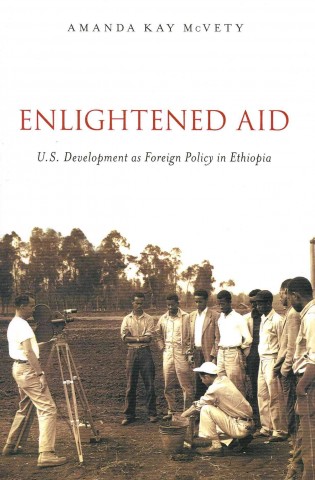U.S. Development as Foreign Policy in Ethiopia (McVety, 2012)
On US foreign aid:
- "In its most optimistic moments, the U.S. government truly believed that by doing good it could indeed do well. The problem is that foreign aid seems to have done more harm than it has good, which means that the United States has not done nearly as well as it hoped." (p. 4)
- "American policymakers were aware from the very beginning that their plans to enhance standards of living, halt the spread of communism, expand the global economy, and encourage the spread of democracy were often not compatible. In such cases, it was democracy that was the most easily forgotten and the people on the ground most easily forsaken." (p. 121)
Expectations of "development":
- "Haile Selassie did not want a nation of farmers; he wanted a nation of industrialists. That put him at odds with the United States, which wanted Ethiopia to be the breadbasket of the Middle East. Breadbaskets, however, as everyone involved well knew, cannot permanently sustain the massive economic growth required to earn the adjective "wealthy." Haile Selassie was no one's fool and he did not intend to place any limitations on his nation's future progress, at least its future economic progress. Its political progress was another question entirely, but then, no one seemed particularly worried about that anyway." (p. 146)
- "Ethiopia badly needed an agricultural revolution, but neither the United States nor Haile Selassie were willing to dedicate the resources necessary to making that happen. Ethiopia got a political revolution instead. The terrible repercussions of that tragedy became evident in the early 1980s, when the Ethiopian people, once famous for their independence became famous for their starvation. Their fall from grace testified to the limitations of a foreign aid agenda that put international politics before international development." (p. 193-194)
On Ethiopia's quasi-colonial experience:
- "Having played a vital role in reclaiming Ethiopia from the Italians, the British remained hesitant to exit and maintained military occupation through the British Military Mission to Ethiopia. Haile Selassie struggled to regain the authority he had lost in 1935 and ostensibly got it with the 1942 Anglo-Ethiopian Agreement, which recognized his nation as "a free and independent state," but all was not as it seemed. In return for a loan, the emperor was forced to grant the British minister "precedence over any other foreign representative" and to allow British advisors a dominant role in the nation's finances... Britain allowed it semi-independence, nodding to the emperor's authority while monopolizing the country's railroads, air service, and economy. The also, although they would deny it for decades, stripped the nation of 80 percent of all the industries built by the Italians during their long occupation of Eritrea and brief occupation of Ethiopia. British troops dismantled factories, packed up the parts, and shipped them to India and Kenya." (p. 71)
On the politics of famine:
- "In the specific case of Ethiopia, the 1982 harvest was the largest ever recorded and the main harvest of 1983 was the third largest on record, though both were still far below the nation's potential. Yet, more than 1.5 million people starved to death in the provinces of Wollo, Tigray and Eritrea between 1983 and 1985. The vulnerability of Ethiopia's peasants stemmed from decades of missed agricultural development opportunities. Their actual deaths were the result of a deliberate government policy to use their vulnerability to its advantage. Most of the victims came from areas that resisted the Derg's tyrannical control. At the height of the famine, Mengistu Haile Mariam was spending 46 percent of the national budget on armaments and used international food aid to fill bellies in his 3-million-man army" (p. 196)
One historian's recommendation for reforming aid:
- "If the world's wealthiest nations truly wanted to help the world's poorest nations, they would curb domestic agricultural subsidies, support global disease eradication efforts, and cut off most of their government-to-government assistance. Economic growth has to come from within. Under such a framework, there would still be room for grassroots-focused aid institutions to provide medical assistance, microfinancing, and education programs. The point is not to keep help from reaching the people who desperately need it, but to force vital changes in government policies that will help those people achieve better lives through their own initiatives. As Amartya Sen has perceptively argued, the end of development is "the capability to choose a life one has reason to value." Development cannot come from foreign aid, because development is fundamentally about the power of autonomy… Keeping bad governments in power through foreign aid is not the path to freedom. Neither is keeping poor farmers poor through subsidies to wealthy conglomerates. Change will not be easy, but it is certainly not impossible." (p. 220)
Featured Posts
Tags
Middle East
Power
Poverty
Post-doc
Civil society
Resilience
Land
Ethnography
Ethiopia
Climate change
Economics
Culture
Capitalism
Ideology
Human Rights
Anthropology
Development Studies
Democracy
Revolution
Inequality
Colonization
Policy
Politics
Food Security
Globalization
decolonization
Participation
Leadership
Fellowship
Rural Development
Ethics
Racism
Education
Conflict
Books
South Africa
Development
Governance
International development
Agriculture
Africa
Institutions
Qatar
Colonialism
Gender
Islam
Interdisciplinary
Migration
Sustainability
History

